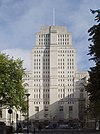School of Advanced Study
This article has multiple issues. Please help improve it or discuss these issues on the talk page. (Learn how and when to remove these template messages)
(Learn how and when to remove this message)
|
| Type | Graduate school |
|---|---|
| Established | 1994 |
Parent institution | University of London |
| Dean | Jo Fox |
| Location | London, England , |
| Campus | Urban |
| Website | www |
The School of Advanced Study (SAS), a postgraduate-only institution of the University of London, is the UK's national centre for the promotion and facilitation of research in the humanities and social sciences. It was established in 1994 and is based in Senate House, in Bloomsbury, central London, close to the British Museum, British Library and several of the colleges of the University of London. The School brings together nine research institutes, many of which have long histories, to provide a wide range of specialist research services, facilities and resources. It offers taught master's and research degrees in humanities and social science subjects (MA, MRes, LLM, MPhil, and PhD).
History[edit]
The School was established on 1 August 1994. Its nine institutes range in age; the oldest, the Institute of Historical Research, was founded in 1921; the youngest, the Institute of Philosophy, was founded in 2005.
Location[edit]
The School is in Senate House, the administrative centre of the University of London, in Bloomsbury, central London.
Organisation and structure[edit]

The Member Institutes of the School are:[1]
- Institute of Advanced Legal Studies
- Institute of Classical Studies
- Institute of Commonwealth Studies
- Institute of English Studies
- Institute of Modern Languages Research (including the Centre for Latin American and Caribbean Studies)
- Institute of Historical Research
- Institute of Philosophy
- Warburg Institute
The Institutes of the School provide a range of specialist research services in their subject areas of expertise. In furtherance of their national and international role, the Institutes of the School undertake high-quality research; maintain and develop library collections and services; develop digital resources; publish journals and book series; host visiting scholars and postdoctoral fellows; organise a range of academic events including workshops, conferences, seminars and lectures; provide specialist research training and postgraduate taught, research, and doctoral programmes.
Publishing[edit]
The University of London Press (also known as UoL Press) is based in the School of Advanced Study. Founded in 1910, it was relaunched in 2019 as a fully open access publisher specializing in "distinctive scholarship at the forefront of the Humanities".[2]
Deans[edit]
Notable deans of the school include:
- Roderick Floud – 2007 to 2009[3]
- Roger Kain – 2010 to 2017[3]
- Rick Rylance – 2017 to 2020[4]
- Jo Fox – since December 2020[5]
References[edit]
- ^ "School of Advanced Study".
- ^ "University of London Press | University of London".
- ^ a b "Roger Kain appointed Dean and Chief Executive of the School of Advanced Study". School of Advanced Study. 23 September 2016. Retrieved 27 January 2022.
- ^ "Institute of English Studies director Rick Rylance appointed as the next Dean of the School of Advanced Study". University of London. April 2017. Retrieved 27 January 2022.
- ^ "Historian Professor Jo Fox appointed as the next dean of University of London's School of Advanced Study". School of Advanced Study. 11 November 2020. Retrieved 27 January 2022.
External links[edit]
Universities and colleges in London | |||||
|---|---|---|---|---|---|
| Universities |
| ||||
| Higher education colleges | |||||
| Further education colleges |
| ||||
| Sixth form colleges |
| ||||
| England |
| ||||||||||||||
|---|---|---|---|---|---|---|---|---|---|---|---|---|---|---|---|
| Northern Ireland | |||||||||||||||
| Scotland | |||||||||||||||
| Wales | |||||||||||||||
| Overseas territories | |||||||||||||||
| Crown dependencies | |||||||||||||||
| Non-geographic | |||||||||||||||
| Related |
| ||||||||||||||
| International | |
|---|---|
| National |

